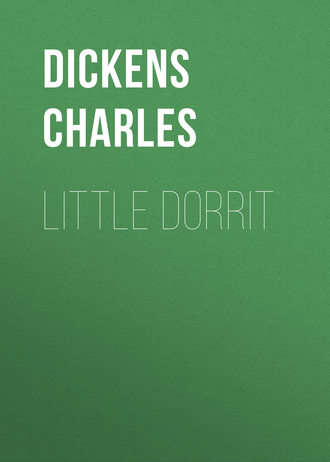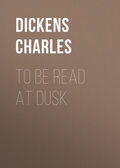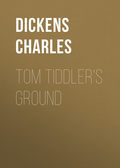
Чарльз Диккенс
Little Dorrit
Bleeding Hearts had but paid, the undertaking would have been a complete success; whereas, by reason of their exclusively confining themselves to owing, the profits actually realised had not yet begun to appear in the books.
Mr Pancks was making a very porcupine of himself by sticking his hair up in the contemplation of this state of accounts, when old Mr Nandy, re-entering the cottage with an air of mystery, entreated them to come and look at the strange behaviour of Mr Baptist, who seemed to have met with something that had scared him. All three going into the shop, and watching through the window, then saw Mr Baptist, pale and agitated, go through the following extraordinary performances. First, he was observed hiding at the top of the steps leading down into the Yard, and peeping up and down the street with his head cautiously thrust out close to the side of the shop-door. After very anxious scrutiny, he came out of his retreat, and went briskly down the street as if he were going away altogether; then, suddenly turned about, and went, at the same pace, and with the same feint, up the street. He had gone no further up the street than he had gone down, when he crossed the road and disappeared. The object of this last manoeuvre was only apparent, when his entering the shop with a sudden twist, from the steps again, explained that he had made a wide and obscure circuit round to the other, or Doyce and Clennam, end of the Yard, and had come through the Yard and bolted in. He was out of breath by that time, as he might well be, and his heart seemed to jerk faster than the little shop-bell, as it quivered and jingled behind him with his hasty shutting of the door.
‘Hallo, old chap!’ said Mr Pancks. ‘Altro, old boy! What’s the matter?’
Mr Baptist, or Signor Cavalletto, understood English now almost as well as Mr Pancks himself, and could speak it very well too. Nevertheless, Mrs Plornish, with a pardonable vanity in that accomplishment of hers which made her all but Italian, stepped in as interpreter.
‘E ask know,’ said Mrs Plornish, ‘what go wrong?’
‘Come into the happy little cottage, Padrona,’ returned Mr Baptist, imparting great stealthiness to his flurried back-handed shake of his right forefinger. ‘Come there!’
Mrs Plornish was proud of the title Padrona, which she regarded as signifying: not so much Mistress of the house, as Mistress of the Italian tongue. She immediately complied with Mr Baptist’s request, and they all went into the cottage.
‘E ope you no fright,’ said Mrs Plornish then, interpreting Mr Pancks in a new way with her usual fertility of resource. ‘What appen? Peaka Padrona!’
‘I have seen some one,’ returned Baptist. ‘I have rincontrato him.’
‘Im? Oo him?’ asked Mrs Plornish.
‘A bad man. A baddest man. I have hoped that I should never see him again.’
‘Ow you know him bad?’ asked Mrs Plornish.
‘It does not matter, Padrona. I know it too well.’
‘E see you?’ asked Mrs Plornish.
‘No. I hope not. I believe not.’
‘He says,’ Mrs Plornish then interpreted, addressing her father and Pancks with mild condescension, ‘that he has met a bad man, but he hopes the bad man didn’t see him – Why,’ inquired Mrs Plornish, reverting to the Italian language, ‘why ope bad man no see?’
‘Padrona, dearest,’ returned the little foreigner whom she so considerately protected, ‘do not ask, I pray. Once again I say it matters not. I have fear of this man. I do not wish to see him, I do not wish to be known of him – never again! Enough, most beautiful. Leave it.’
The topic was so disagreeable to him, and so put his usual liveliness to the rout, that Mrs Plornish forbore to press him further: the rather as the tea had been drawing for some time on the hob. But she was not the less surprised and curious for asking no more questions; neither was Mr Pancks, whose expressive breathing had been labouring hard since the entrance of the little man, like a locomotive engine with a great load getting up a steep incline. Maggy, now better dressed than of yore, though still faithful to the monstrous character of her cap, had been in the background from the first with open mouth and eyes, which staring and gaping features were not diminished in breadth by the untimely suppression of the subject. However, no more was said about it, though much appeared to be thought on all sides: by no means excepting the two young Plornishes, who partook of the evening meal as if their eating the bread and butter were rendered almost superfluous by the painful probability of the worst of men shortly presenting himself for the purpose of eating them. Mr Baptist, by degrees began to chirp a little; but never stirred from the seat he had taken behind the door and close to the window, though it was not his usual place. As often as the little bell rang, he started and peeped out secretly, with the end of the little curtain in his hand and the rest before his face; evidently not at all satisfied but that the man he dreaded had tracked him through all his doublings and turnings, with the certainty of a terrible bloodhound.
The entrance, at various times, of two or three customers and of Mr Plornish, gave Mr Baptist just enough of this employment to keep the attention of the company fixed upon him. Tea was over, and the children were abed, and Mrs Plornish was feeling her way to the dutiful proposal that her father should favour them with Chloe, when the bell rang again, and Mr Clennam came in.
Clennam had been poring late over his books and letters; for the waiting-rooms of the Circumlocution Office ravaged his time sorely. Over and above that, he was depressed and made uneasy by the late occurrence at his mother’s. He looked worn and solitary. He felt so, too; but, nevertheless, was returning home from his counting-house by that end of the Yard to give them the intelligence that he had received another letter from Miss Dorrit.
The news made a sensation in the cottage which drew off the general attention from Mr Baptist. Maggy, who pushed her way into the foreground immediately, would have seemed to draw in the tidings of her Little Mother equally at her ears, nose, mouth, and eyes, but that the last were obstructed by tears. She was particularly delighted when Clennam assured her that there were hospitals, and very kindly conducted hospitals, in Rome. Mr Pancks rose into new distinction in virtue of being specially remembered in the letter. Everybody was pleased and interested, and Clennam was well repaid for his trouble.
‘But you are tired, sir. Let me make you a cup of tea,’ said Mrs Plornish, ‘if you’d condescend to take such a thing in the cottage; and many thanks to you, too, I am sure, for bearing us in mind so kindly.’
Mr Plornish deeming it incumbent on him, as host, to add his personal acknowledgments, tendered them in the form which always expressed his highest ideal of a combination of ceremony with sincerity.
‘John Edward Nandy,’ said Mr Plornish, addressing the old gentleman. ‘Sir. It’s not too often that you see unpretending actions without a spark of pride, and therefore when you see them give grateful honour unto the same, being that if you don’t, and live to want ‘em, it follows serve you right.’
To which Mr Nandy replied:
‘I am heartily of your opinion, Thomas, and which your opinion is the same as mine, and therefore no more words and not being backwards with that opinion, which opinion giving it as yes, Thomas, yes, is the opinion in which yourself and me must ever be unanimously jined by all, and where there is not difference of opinion there can be none but one opinion, which fully no, Thomas, Thomas, no!’
Arthur, with less formality, expressed himself gratified by their high appreciation of so very slight an attention on his part; and explained as to the tea that he had not yet dined, and was going straight home to refresh after a long day’s labour, or he would have readily accepted the hospitable offer. As Mr Pancks was somewhat noisily getting his steam up for departure, he concluded by asking that gentleman if he would walk with him? Mr Pancks said he desired no better engagement, and the two took leave of Happy Cottage.
‘If you will come home with me, Pancks,’ said Arthur, when they got into the street, ‘and will share what dinner or supper there is, it will be next door to an act of charity; for I am weary and out of sorts to-night.’
‘Ask me to do a greater thing than that,’ said Pancks, ‘when you want it done, and I’ll do it.’
Between this eccentric personage and Clennam, a tacit understanding and accord had been always improving since Mr Pancks flew over Mr Rugg’s back in the Marshalsea Yard. When the carriage drove away on the memorable day of the family’s departure, these two had looked after it together, and had walked slowly away together. When the first letter came from little Dorrit, nobody was more interested in hearing of her than Mr Pancks. The second letter, at that moment in Clennam’s breast-pocket, particularly remembered him by name. Though he had never before made any profession or protestation to Clennam, and though what he had just said was little enough as to the words in which it was expressed, Clennam had long had a growing belief that Mr Pancks, in his own odd way, was becoming attached to him. All these strings intertwining made Pancks a very cable of anchorage that night.
‘I am quite alone,’ Arthur explained as they walked on. ‘My partner is away, busily engaged at a distance on his branch of our business, and you shall do just as you like.’
‘Thank you. You didn’t take particular notice of little Altro just now; did you?’ said Pancks.
‘No. Why?’
‘He’s a bright fellow, and I like him,’ said Pancks. ‘Something has gone amiss with him to-day. Have you any idea of any cause that can have overset him?’
‘You surprise me! None whatever.’
Mr Pancks gave his reasons for the inquiry. Arthur was quite unprepared for them, and quite unable to suggest an explanation of them.
‘Perhaps you’ll ask him,’ said Pancks, ‘as he’s a stranger?’
‘Ask him what?’ returned Clennam.
‘What he has on his mind.’
‘I ought first to see for myself that he has something on his mind, I think,’ said Clennam. ‘I have found him in every way so diligent, so grateful (for little enough), and so trustworthy, that it might look like suspecting him. And that would be very unjust.’
‘True,’ said Pancks. ‘But, I say! You oughtn’t to be anybody’s proprietor, Mr Clennam. You’re much too delicate.’
‘For the matter of that,’ returned Clennam laughing, ‘I have not a large proprietary share in Cavalletto. His carving is his livelihood. He keeps the keys of the Factory, watches it every alternate night, and acts as a sort of housekeeper to it generally; but we have little work in the way of his ingenuity, though we give him what we have. No! I am rather his adviser than his proprietor. To call me his standing counsel and his banker would be nearer the fact. Speaking of being his banker, is it not curious, Pancks, that the ventures which run just now in so many people’s heads, should run even in little Cavalletto’s?’
‘Ventures?’ retorted Pancks, with a snort. ‘What ventures?’
‘These Merdle enterprises.’
‘Oh! Investments,’ said Pancks. ‘Ay, ay! I didn’t know you were speaking of investments.’
His quick way of replying caused Clennam to look at him, with a doubt whether he meant more than he said. As it was accompanied, however, with a quickening of his pace and a corresponding increase in the labouring of his machinery, Arthur did not pursue the matter, and they soon arrived at his house.
A dinner of soup and a pigeon-pie, served on a little round table before the fire, and flavoured with a bottle of good wine, oiled Mr Pancks’s works in a highly effective manner; so that when Clennam produced his Eastern pipe, and handed Mr Pancks another Eastern pipe, the latter gentleman was perfectly comfortable.
They puffed for a while in silence, Mr Pancks like a steam-vessel with wind, tide, calm water, and all other sea-going conditions in her favour. He was the first to speak, and he spoke thus:
‘Yes. Investments is the word.’
Clennam, with his former look, said ‘Ah!’
‘I am going back to it, you see,’ said Pancks.
‘Yes. I see you are going back to it,’ returned Clennam, wondering why.
‘Wasn’t it a curious thing that they should run in little Altro’s head? Eh?’ said Pancks as he smoked. ‘Wasn’t that how you put it?’
‘That was what I said.’
‘Ay! But think of the whole Yard having got it. Think of their all meeting me with it, on my collecting days, here and there and everywhere. Whether they pay, or whether they don’t pay. Merdle, Merdle, Merdle. Always Merdle.’
‘Very strange how these runs on an infatuation prevail,’ said Arthur.
‘An’t it?’ returned Pancks. After smoking for a minute or so, more drily than comported with his recent oiling, he added: ‘Because you see these people don’t understand the subject.’
‘Not a bit,’ assented Clennam.
‘Not a bit,’ cried Pancks. ‘Know nothing of figures. Know nothing of money questions. Never made a calculation. Never worked it, sir!’
‘If they had – ’ Clennam was going on to say; when Mr Pancks, without change of countenance, produced a sound so far surpassing all his usual efforts, nasal or bronchial, that he stopped.
‘If they had?’ repeated Pancks in an inquiring tone.
‘I thought you – spoke,’ said Arthur, hesitating what name to give the interruption.
‘Not at all,’ said Pancks. ‘Not yet. I may in a minute. If they had?’
‘If they had,’ observed Clennam, who was a little at a loss how to take his friend, ‘why, I suppose they would have known better.’
‘How so, Mr Clennam?’ Pancks asked quickly, and with an odd effect of having been from the commencement of the conversation loaded with the heavy charge he now fired off. ‘They’re right, you know. They don’t mean to be, but they’re right.’
‘Right in sharing Cavalletto’s inclination to speculate with Mr Merdle?’
‘Per-fectly, sir,’ said Pancks. ‘I’ve gone into it. I’ve made the calculations. I’ve worked it. They’re safe and genuine.’ Relieved by having got to this, Mr Pancks took as long a pull as his lungs would permit at his Eastern pipe, and looked sagaciously and steadily at Clennam while inhaling and exhaling too.
In those moments, Mr Pancks began to give out the dangerous infection with which he was laden. It is the manner of communicating these diseases; it is the subtle way in which they go about.
‘Do you mean, my good Pancks,’ asked Clennam emphatically, ‘that you would put that thousand pounds of yours, let us say, for instance, out at this kind of interest?’
‘Certainly,’ said Pancks. ‘Already done it, sir.’
Mr Pancks took another long inhalation, another long exhalation, another long sagacious look at Clennam.
‘I tell you, Mr Clennam, I’ve gone into it,’ said Pancks. ‘He’s a man of immense resources – enormous capital – government influence. They’re the best schemes afloat. They’re safe. They’re certain.’
‘Well!’ returned Clennam, looking first at him gravely and then at the fire gravely. ‘You surprise me!’
‘Bah!’ Pancks retorted. ‘Don’t say that, sir. It’s what you ought to do yourself! Why don’t you do as I do?’
Of whom Mr Pancks had taken the prevalent disease, he could no more have told than if he had unconsciously taken a fever. Bred at first, as many physical diseases are, in the wickedness of men, and then disseminated in their ignorance, these epidemics, after a period, get communicated to many sufferers who are neither ignorant nor wicked. Mr Pancks might, or might not, have caught the illness himself from a subject of this class; but in this category he appeared before Clennam, and the infection he threw off was all the more virulent.
‘And you have really invested,’ Clennam had already passed to that word, ‘your thousand pounds, Pancks?’
‘To be sure, sir!’ replied Pancks boldly, with a puff of smoke. ‘And only wish it ten!’
Now, Clennam had two subjects lying heavy on his lonely mind that night; the one, his partner’s long-deferred hope; the other, what he had seen and heard at his mother’s. In the relief of having this companion, and of feeling that he could trust him, he passed on to both, and both brought him round again, with an increase and acceleration of force, to his point of departure.
It came about in the simplest manner. Quitting the investment subject, after an interval of silent looking at the fire through the smoke of his pipe, he told Pancks how and why he was occupied with the great National Department. ‘A hard case it has been, and a hard case it is on Doyce,’ he finished by saying, with all the honest feeling the topic roused in him.
‘Hard indeed,’ Pancks acquiesced. ‘But you manage for him, Mr Clennam?’
‘How do you mean?’
‘Manage the money part of the business?’
‘Yes. As well as I can.’
‘Manage it better, sir,’ said Pancks. ‘Recompense him for his toils and disappointments. Give him the chances of the time. He’ll never benefit himself in that way, patient and preoccupied workman. He looks to you, sir.’
‘I do my best, Pancks,’ returned Clennam, uneasily. ‘As to duly weighing and considering these new enterprises of which I have had no experience, I doubt if I am fit for it, I am growing old.’
‘Growing old?’ cried Pancks. ‘Ha, ha!’
There was something so indubitably genuine in the wonderful laugh, and series of snorts and puffs, engendered in Mr Pancks’s astonishment at, and utter rejection of, the idea, that his being quite in earnest could not be questioned.
‘Growing old?’ cried Pancks. ‘Hear, hear, hear! Old? Hear him, hear him!’
The positive refusal expressed in Mr Pancks’s continued snorts, no less than in these exclamations, to entertain the sentiment for a single instant, drove Arthur away from it. Indeed, he was fearful of something happening to Mr Pancks in the violent conflict that took place between the breath he jerked out of himself and the smoke he jerked into himself. This abandonment of the second topic threw him on the third.
‘Young, old, or middle-aged, Pancks,’ he said, when there was a favourable pause, ‘I am in a very anxious and uncertain state; a state that even leads me to doubt whether anything now seeming to belong to me, may be really mine. Shall I tell you how this is? Shall I put a great trust in you?’
‘You shall, sir,’ said Pancks, ‘if you believe me worthy of it.’
‘I do.’
‘You may!’ Mr Pancks’s short and sharp rejoinder, confirmed by the sudden outstretching of his coaly hand, was most expressive and convincing. Arthur shook the hand warmly.
He then, softening the nature of his old apprehensions as much as was possible consistently with their being made intelligible and never alluding to his mother by name, but speaking vaguely of a relation of his, confided to Mr Pancks a broad outline of the misgivings he entertained, and of the interview he had witnessed. Mr Pancks listened with such interest that, regardless of the charms of the Eastern pipe, he put it in the grate among the fire-irons, and occupied his hands during the whole recital in so erecting the loops and hooks of hair all over his head, that he looked, when it came to a conclusion, like a journeyman Hamlet in conversation with his father’s spirit.
‘Brings me back, sir,’ was his exclamation then, with a startling touch on Clennam’s knee, ‘brings me back, sir, to the Investments! I don’t say anything of your making yourself poor to repair a wrong you never committed. That’s you. A man must be himself. But I say this, fearing you may want money to save your own blood from exposure and disgrace – make as much as you can!’
Arthur shook his head, but looked at him thoughtfully too.
‘Be as rich as you can, sir,’ Pancks adjured him with a powerful concentration of all his energies on the advice. ‘Be as rich as you honestly can. It’s your duty. Not for your sake, but for the sake of others. Take time by the forelock. Poor Mr Doyce (who really is growing old) depends upon you. Your relative depends upon you. You don’t know what depends upon you.’
‘Well, well, well!’ returned Arthur. ‘Enough for to-night.’
‘One word more, Mr Clennam,’ retorted Pancks, ‘and then enough for to-night. Why should you leave all the gains to the gluttons, knaves, and impostors? Why should you leave all the gains that are to be got to my proprietor and the like of him? Yet you’re always doing it. When I say you, I mean such men as you. You know you are. Why, I see it every day of my life. I see nothing else. It’s my business to see it. Therefore I say,’ urged Pancks, ‘Go in and win!’
‘But what of Go in and lose?’ said Arthur.
‘Can’t be done, sir,’ returned Pancks. ‘I have looked into it. Name up everywhere – immense resources – enormous capital – great position – high connection – government influence. Can’t be done!’
Gradually, after this closing exposition, Mr Pancks subsided; allowed his hair to droop as much as it ever would droop on the utmost persuasion; reclaimed the pipe from the fire-irons, filled it anew, and smoked it out. They said little more; but were company to one another in silently pursuing the same subjects, and did not part until midnight. On taking his leave, Mr Pancks, when he had shaken hands with Clennam, worked completely round him before he steamed out at the door. This, Arthur received as an assurance that he might implicitly rely on Pancks, if he ever should come to need assistance; either in any of the matters of which they had spoken that night, or any other subject that could in any way affect himself.
At intervals all next day, and even while his attention was fixed on other things, he thought of Mr Pancks’s investment of his thousand pounds, and of his having ‘looked into it.’ He thought of Mr Pancks’s being so sanguine in this matter, and of his not being usually of a sanguine character. He thought of the great National Department, and of the delight it would be to him to see Doyce better off. He thought of the darkly threatening place that went by the name of Home in his remembrance, and of the gathering shadows which made it yet more darkly threatening than of old. He observed anew that wherever he went, he saw, or heard, or touched, the celebrated name of Merdle; he found it difficult even to remain at his desk a couple of hours, without having it presented to one of his bodily senses through some agency or other. He began to think it was curious too that it should be everywhere, and that nobody but he should seem to have any mistrust of it. Though indeed he began to remember, when he got to this, even he did not mistrust it; he had only happened to keep aloof from it.
Such symptoms, when a disease of the kind is rife, are usually the signs of sickening.







